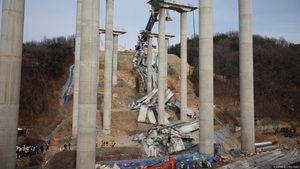Spanish fashion retail giant Zara has officially closed its flagship store located at the historic Ismail Building on Flora Fountain, South Mumbai. This closure, effective February 24, marks the end of an era for the iconic outlet, which operated for eight years, since its opening in May 2017.
Reportedly, Zara was struggling to keep up with its rental obligations of ₹3.02 crore per month—₹36.18 crore annually—which raised questions about the store's financial sustainability. According to property registration documents from Propstack cited by Hindustan Times, Zara initially paid ₹2.25 crore monthly when it leased the five-story space of 51,300 square feet, with rent increasing by 5% three years after the lease began, reflecting the increasing operational pressures on top of the high costs.
Despite being one of the largest Zara locations in India, the store struggled with declining foot traffic and insufficient sales to match its soaring rental expenses. Various sources indicated this closure as part of Zara's strategy to navigate the competitive retail environment, as their presence has now diminished to just 22 stores across the country, with five remaining operational within Mumbai.
The vacant retail space has been leased by Purple Style Labs, another luxury brand, which will occupy 60,000 sq. ft. with plans to debut its Pernia's Pop-Up Shop concept. The new lease agreement, finalized on December 23, stipulates annual rent escalations starting at ₹36 crore and running up to ₹45.6 crore by the lease’s fifth year, translating to approximately ₹10 lakh daily. Industry insiders suggest this shift to Purple Style Labs indicates continued interest and investment within high-end retail offerings associated with heritage properties.
Social media has reacted to Zara's exit with mixed emotions, as many cherished the longstanding presence of the fashion retailer. One Twitter user expressed heartache, stating, "How will I EVER recover from Zara Mumbai store being closed? Udhar kitni yaadein hai meri (I have so many memories there)." Another said, "My dreams are being shut down omg" reflecting the emotional connection many customers had with the store.
Zara has built its brand presence across India through its joint venture with the Tata Group, entering the market back in 2010. They have made considerable investment and expansion efforts, but high rents have led them to reconsider existing locations. Retail experts believe this trend indicates larger patterns among global fashion brands re-evaluations of their position against rising operational costs and shifting demographic shopping behaviors favoring more populous, high-traffic retail hotspots.
Arif Fazlani, managing director of the Fazlani Group which owns the Ismail Building, affirmed Zara's handover of the premises, indicating the impending transition to Purple Style Labs. "Zara will hand over the premises by the end of this month, and starting March 1, there will be a new tenant," he confirmed. The operational dynamics and changes are reflective of broader shifts within the retail sector focused on aligning with consumer preferences and optimizing economic viability.
Analysis suggests the consumer demographic able to afford premium products has migrated over time, seeking out venues offering elevated buying experiences, like those now found prominently within Palladium Mall, attracting higher foot traffic than the South Mumbai location traditionally offered.
The move made by Purple Style Labs signifies the building's retention of its historical significance and luxury status within Mumbai's competitive retail market. Purple Style Labs is known for incubing young designers through its Pernia's Pop-Up Shop brand, highlighting the rise of niche luxury markets within traditional retail spaces. The company reportedly had to pay ₹18 crore as deposit upon securing the lease along with additional fees and stamp duty, amounting to substantial investments aimed at modernizing the iconic venue.
While Zara continues to chart its path amid industry shifts, its recent closure provokes questions about the resilience and sustainability of large retail chains within urban zones characterized by rapidly increasing juristic operations of urban spaces exacerbated by rental challenges.
Without doubt, the dynamic changes within Mumbai’s retail environment articulate larger forces influencing the fashion industry as brands navigate competition and adapt to the modern shopping experience.
Zara maintains promotional commitments to its remaining locations, assuring customers they can find their beloved styles at the remaining outlets or through their existing online platform. This has raised hopes among local fans who are eager to see how the shifting retail atmosphere will open new doors for luxury brands even as traditional giants recalibrate their strategies.



